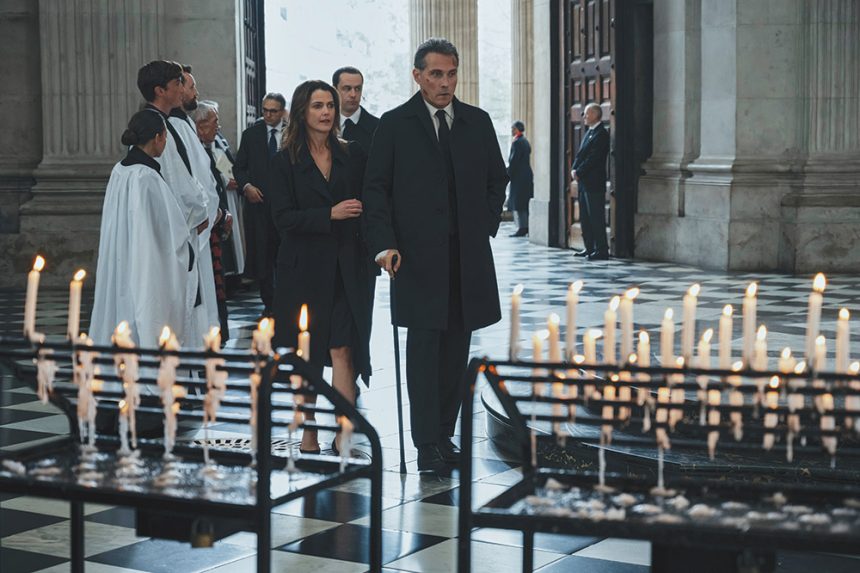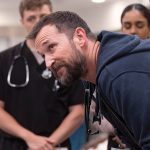Debora Cahn Talks Season 3 of ‘The Diplomat’ and Whether She’ll Infuse the Current Political Climate Into the Series
Diplomacy ranks high among Emmy voters, even if not so much in the current realm of American politics. The Diplomat has two Emmy nominations for 2025, and they’re big ones: best drama series and best lead actress in a drama for Keri Russell, who plays Kate Wyler, the U.S. ambassador to the U.K. Rufus Sewell plays her husband, Hal, a former ambassador now without a foreign service post. Debora Cahn, creator and showrunner of the Netflix series, discusses season two’s cliff-hanger ending and the importance of highlighting the work of civil servants.
The end of season two left a lot up in the air with the revelation that Vice President Grace Penn (Allison Janney) was behind the naval attack at the start of the series and the relationship she and Kate Wyler have now that Grace is president. Where will things pick up in season three?
It’s right after. I’ve never written a show like this — we always feel like we want to come in a second later. But that is where we’re coming back for the beginning of season three. It just feels like we want to keep riding the momentum of the end of season two.
Anything more you can say about what folks are going to see?
You Might Also Like
We have more Allison Janney, and we’re bringing in Bradley Whitford [as her character’s husband].
You worked with both of them on The West Wing — how has it been getting to write for them again?
Fantastic. They’re loving working with each other. They’re loving working with Keri and Rufus. It’s really been joyful to come back around to a working relationship that we had 20 years ago and seeing them build new characters. I was nervous that it was going to feel like C.J. and Josh, and it doesn’t. They have a wonderful relationship as husband and wife [onscreen], and it’s a lot of fun to see them sparring with each other as characters and as actors.
Streamers seem to be coming around to the idea that not having long gaps between seasons is good, which was likely part of The Diplomat‘s early pickup for a fourth season. I assume it’s also good for your crew to know that you’re going to keep the momentum up?
Yes, and it’s best of all, people being able to know that they’re coming back. When you put together a crew and a cast like this, you want them to be available. Knowing that there’s not going to be a lot of time passing between one season and the next, it’s a lot easier for people to say, “Absolutely, I want to come back.”
The Diplomat premiered in a very different political climate from the one we’re in now. As you continue to work on the show, does that change the way you approach the material?
First of all, I’m really grateful that we get to talk about people who work for the government, who are being fired by the thousands every day and treated like garbage, in the most literal sense. It feels important to be honoring their work. It used to be that we would talk to people who were in this field and watched the show, and they would say, “Well, it’s nice now that the show is out, my parents understand what I do as a diplomat.” Nowadays we have people coming up to us and saying, “Thank you for recognizing that civil service means something, and that the work that we did was important and that somebody saw it.” It’s incredibly moving to hear that, and I also feel a responsibility to honor the work that they do. This isn’t supposed to be some sort of Pollyanna look at the government, but it is important to keep the current situation in our heads all the time when we’re building stories. I feel a certain responsibility to honor the sacrifice that so many people make to work for the country. I don’t want to be making a direct commentary on anything that’s happening now, and I don’t want to be talking about people who are currently in those jobs. I would rather be telling stories about the version of it that we would like to see, or the way that it’s working — not necessarily when it’s working well, because we tell a lot of stories about how it falls apart. But I would rather be allowing the show to have its own ecosystem and not have it tangled up in what’s happening on the front pages.
This story first appeared in an August stand-alone issue of The Hollywood Reporter magazine. To receive the magazine, click here to subscribe.







